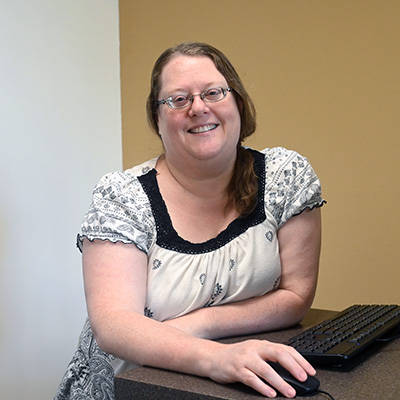
Wendy Brame
Wendy Brame loved higher education when she was an undergraduate student, but it took her seven changes of a major before she found her exact niche at Brigham Young University in Utah.
Now, as she serves as the Briar Cliff University chair of the Criminal Justice and Sociology Departments, Brame has her experiences in mind when serving as an adviser to BCU students who are getting their feet under them.
Brame is a big believer that the college experience should not only lead to a major that is interesting to the student, but also result in a career that can pay the bills for a comfortable life.
“I want students to get it right for themselves, so they like what they are studying and that it leads to a job they will enjoy. It is pretty miserable to be in something you don’t enjoy,” she said.
Brame herself knows that life lesson well. Her route to Briar Cliff followed five years working as an attorney, a period that wasn’t fulfilling for her. Academia beckoned, and that’s been a great shift for her. Brame said there certainly are clearly visible moments in a classroom where students, during discussions, fully grasp the concepts at hand.
She had those types of “a-ha” moments at BYU shortly after realizing her long childhood desire to be a veterinarian wasn’t in the cards after all, a lesson that was delivered during a Chemistry class. So, what should she do?
“I took a Sociology class as a freshman and fell in love with it. I called my parents to tell them I found my major,” she said.
Raised in the Pacific Northwest, Brame added to her undergrad degree in social work with a law degree from the University of Kansas and a doctorate from Oklahoma State University. Throughout that path, sociology remained a key love, and she believes that coursework benefits others willing to dig into it.
“No matter what career you are going into, sociology can help you. It helps a person to be open to different ways of looking at the world,” Brame said.
The three pillars of criminal justice include policing, the courts, and the corrections system, and Briar Cliff students get a full picture of all three.
“Most of our students are interested in the laws and why people would break them. Being part of a Franciscan values college, we also delve into ethics, to remember the humanity of people and that rehabilitation is possible,” Brame said. The weaving in of ethics is crucial, she added, since seeking “to improve society is an important piece.”
Brame has worked at Briar Cliff for 13 years, all as chair of the department. She has one other colleague in the Criminal Justice Department, Patricia Feese, who is an experienced person in the field by virtue of 30 years of work in law enforcement in Colorado before starting at BCU. Feese instructs some courses that can result in a homeland security certificate.
In most years, there are a combined 40 students who major in criminal justice, with about 10 graduating each May from Briar Cliff. Criminal justice at BCU is a generalist program without set tracks, but with plentiful electives so that students can personally pick courses to customize additional skills they see helping them for the career they anticipate.
“We try to be very student-focused, on what you want to do, not, ‘Here is our program, you have to fit into it,’” Brame said. “We really encourage double majors in our department. They get a solid grounding in the criminal justice system and how it fits together.”
Jobs that BCU Criminal Justice Department alumni move into include law enforcement, court-related positions, the Department of Natural Resources, along with school resource officer and homeland security jobs.
This is part of a Faculty Stories series profiling all the chairs of BCU academic departments in 2023.